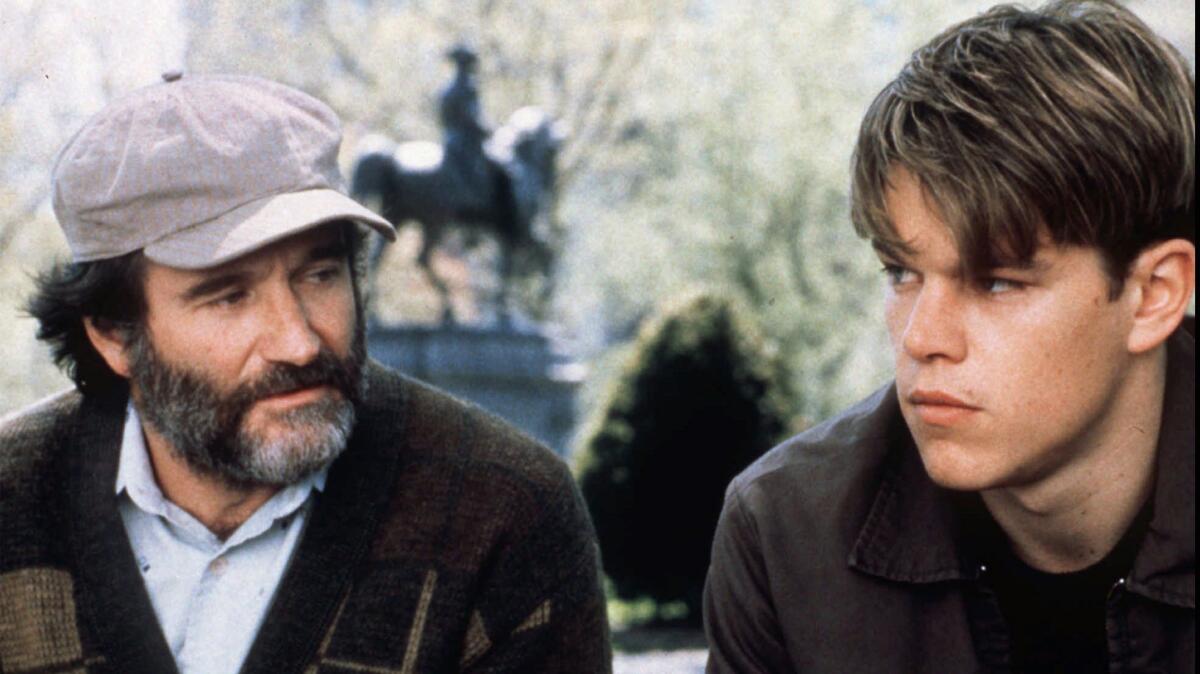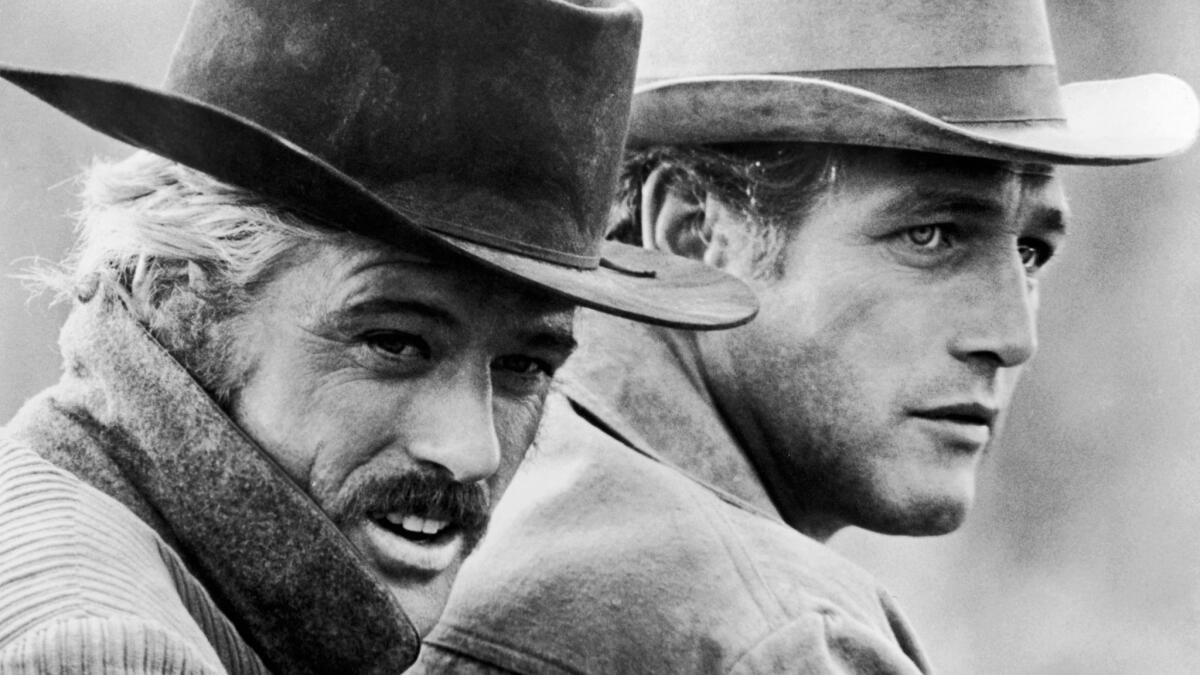R.I.P. for the spec script, long a source of some of Hollywood’s most beloved films
The once-mighty movie “spec” script, long a source of some of Hollywood’s most-beloved films, was pronounced dead after a lengthy illness. As befits many screen legends, the spec script died alone and in search of validation from a fickle, what-have-you-done-lately kind of town.
So-called specs, unsolicited screenplays that writers submit to producers in hopes of bypassing the studio system, resulted in such celebrated movies as “Butch Cassidy and the Sundance Kid,” “Thelma & Louise” and “Good Will Hunting.”
“Yes, the spec feature script is pretty much dead,” confirmed David Howard, a tenured professor of screenwriting at USC who, as a writer himself, was close to the deceased.
“It’s been kind of a Balkanization,” explained former Sony executive and independent producer Elizabeth Cantillon. “The original screenplay is now a Sundance movie.”
“Originality is lost,” bemoaned Nicholas Kazan, a longtime screenwriter who concentrated on specs throughout his long career. “I basically made a living writing specs because it lets me tell the story I want to tell while keeping me fresh and enthusiastic.”

“Real loss is only possible when you love something more than you love yourself.”
Robin Williams, in “Good Will Hunting,” a spec script
Don’t look for any candle-lit shrines along Hollywood Boulevard, or weepy tribute pages online. The spec made countless contributions to the industry but lived behind the scenes — like grips and best boys — unglamorous and barely known.
There were no next of kin.
Autopsy reports were pending, but sources close to the subject blamed market forces for the demise of the specs.
Primarily, the industry’s desire for previously published works, from novels to comic books, took much of the blame for the collapse. But economic forces, from globalization to the downfall of the rental DVD market, were also cited as factors in the death of the spec; talented writers’ increasing preference to work in television is considered another factor.
Another culprit: Hollywood is making far fewer movies than it did even 10 years ago. Coincidentally or not, Hollywood box office receipts in 2017 slipped to their lowest level since 1995, amid summer flops and a dearth of fresh ideas.
The spec, if nothing else, was the ultimate triumph of the blank page. Like Marilyn Monroe, it came from nothing. It also had a troubled start.
According to lore, the spec was born in 1933, when legendary scribe Preston Sturges sold “The Power and the Glory” to Fox for $17,500, plus a portion of its profits. Not to be confused with the more-renowned Graham Greene novel seven years later, the movie failed to find an audience, and Sturges went back to writing what the studios wanted until he could resurrect his career.
Throughout the ’40s and ’50s, cognizant of Sturges’ failure with a spec and filling their pockets with studio projects, writers tended to shun specs. Projects were assigned to writers, who would take the idea and develop it into a feature film script.
When the studio system began to break down, that same sequence continued. Writers would either receive an assignment from a studio or producer or pitch an idea in advance, then go off to write.
In a sense, writers had become carpenters rather than architects, at the mercy of executives and producers, who weren’t necessarily elite story tellers.
“Nobody knows anything,” is screenwriter William Goldman’s famous quote on what will and won’t work in Hollywood.
Well, Hollywood knows one thing: Goldman, as talented a writer as the industry has ever known, single-handedly resurrected the spec script. Without him, the genre may have smoldered for decades more.
The rebirth came in the ’60s, when Goldman decided to write a Western buddy film with a modern sensibility. Critical to the project, he thought, was to be able to shape the story without a studio’s interference in tone, plot, character and dialogue.
So he wrote it “on spec,” creating “Butch Cassidy and the Sundance Kid,” which would go on to become the highest-grossing film of 1969 and win a screenwriting Oscar.

Goldman’s memorable script featured dialogue like this:
Etta Place: Why is there never any money, Butch?
Butch Cassidy: Well, I swear, Etta, I don't know. I've been working like a dog all my life and I can't get a penny ahead
Etta Place: Sundance says it's because you're a soft touch, and always taking expensive vacations, and buying drinks for everyone, and you're a rotten gambler.
Butch Cassidy: Well that might have something to do with it.
Goldman’s vision resurrected the genre.
“The modern spec script era started with Butch Cassidy, and execs saw they could make a hit movie with no development and no expense,” Kazan said.
If that was the spark, the writer’s guild strike of 1988 was the gasoline truck. The strike gave writers time away from their staff jobs and script rewrites to generate piles of original screenplays. Studios, freed from development costs and eager to re-fill their script pipeline after the long strike, began to spend freely on specs.
“What happened was capitalism at its worst,” recalls Kazan. “Fear and panic and greed took over.
“A script would go out on Friday, and you’d go to your kid’s soccer game on Saturday, and you’d see an exec go off to make a call to up an offer….It became this feverish thing. People bought a lot of stuff that didn’t get made,” Kazan said.
Yet, the spec script soon became the tech-startup if its day. By 1990, stories of million-dollar paydays were rampant. A young UCLA-trained writer from Pittsburgh, Shane Black, generated headlines, and fed the frenzy, when he made $1.75 million for “The Last Boy Scout.”
When “Basic Instinct” became box office gold, the spec bull market increased, gathering juice throughout the decade. By the mid-’90s, even lawyers and school teachers — and of course underpaid journalists — were joining the treasure hunt with scripts written during their off-hours.
Chad Clough, chief executive of Script Pipeline, a writer development business, remembers arriving in Hollywood in 2000 to “ridiculous spec sales, three a day.”
“They weren’t going for $250,000 either,” he says. “They were going for a million.”
What happened was capitalism at its worst. Fear and panic and greed took over.
— Nicholas Kazan, screenwriter
Then, as quickly as the spec script flourished, it began a Norma Desmond fade.
A series of spec disappointments — including “Radio Flyer” and “The Long Kiss Goodnight” — was partly to blame, as was the decline in the DVD rental market and the explosion of HBO and other high-end cable outlets. It was as if the once-mighty spec script had fallen out of a plane.
“The studios believe that it’s very hard to sell original screenplay ideas that are not based on original intellectual properties,” said Cantillon, the former Sony exec. “If you’re going to hit a global home run, then you’re not going to be able to do that with an original screenplay.”
Specs are often “too American,” she said, for overseas audiences in need of less homespun, or personal stories.
Consumers might ask if the decline of the spec is such a loss, given the growing quality and reach of premium cable channels and streaming outlets such as Netflix and Amazon.
USC screenwriting prof Howard, believes current trends are “separating us.”
“Three hundred people in a movie theater, all enjoying something together, that’s the loss,” he says.
Kazan says: “There was a flawed system, and now there’s a different flawed system.”
A silver lining? “I think the feeding frenzy era is over, and that’s a good thing.
“I think there’ll be a turn back,” he says. “When a spec goes out now, people pay attention.”
Exhibit A in Kazan’s case: The script for “The Post,” an Oscar contender about the Washington Post that was based on a spec by Liz Hannah. (Director Steven Spielberg brought in screenwriter Josh Singer, an Oscar winner for “Spotlight,” to work on the rewrite).
Clough, of Script Pipeline, says the spec market could be — like old vinyl or vintage guitars — a thing of the past and the future. He cites an increasing voracious marketplace, as evidenced by Netflix’s pledge to produce 80 new original movies in 2018.
So could the corpse soon rise from the dead, for a surprise Hollywood ending, even a fresh life? Perhaps.
“Right now, the industry wants original voices,” Clough said. “There’s still a need for an excellent script.”
Twitter: @erskinetimes
The biggest entertainment stories
Get our big stories about Hollywood, film, television, music, arts, culture and more right in your inbox as soon as they publish.
You may occasionally receive promotional content from the Los Angeles Times.



